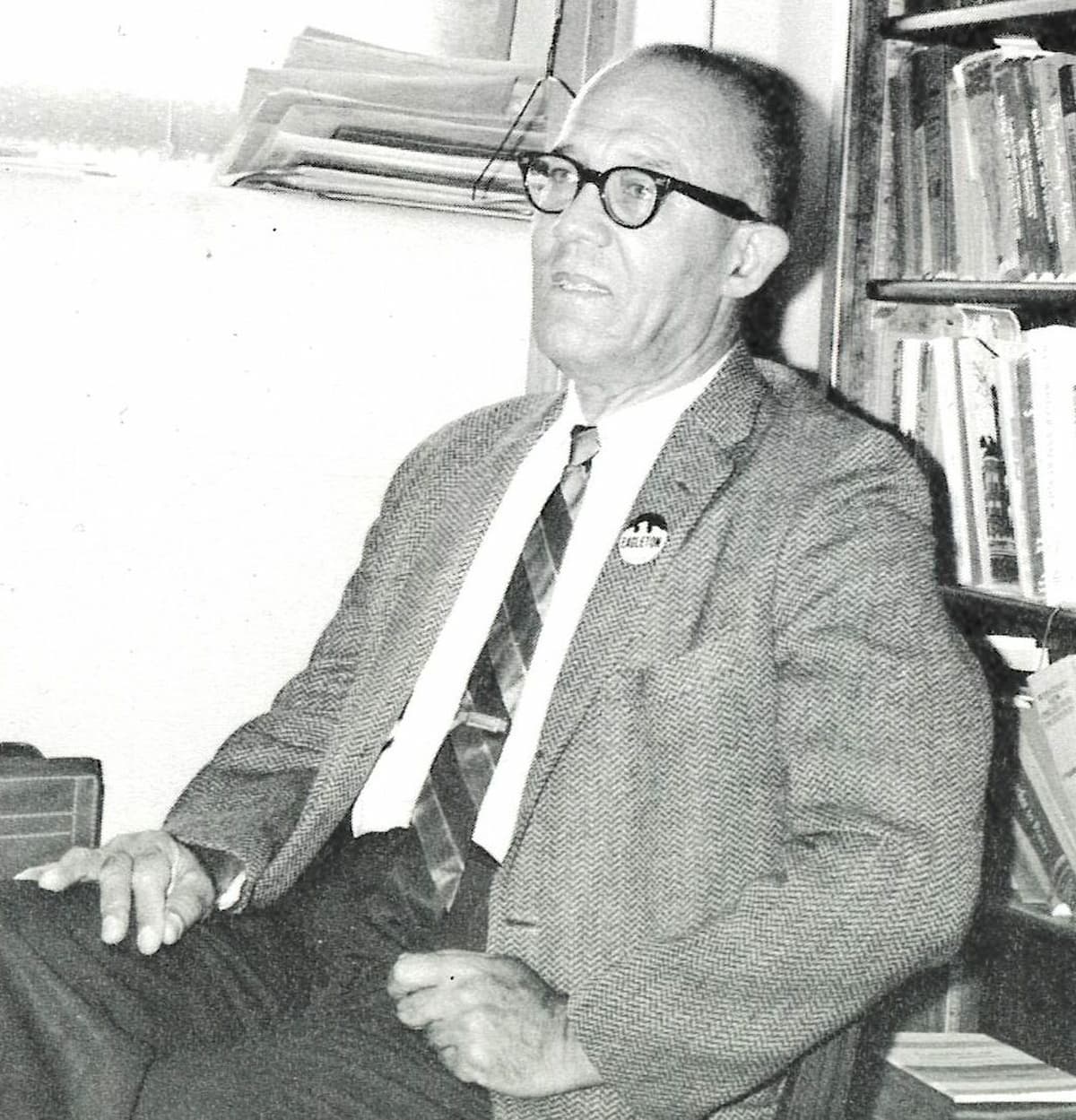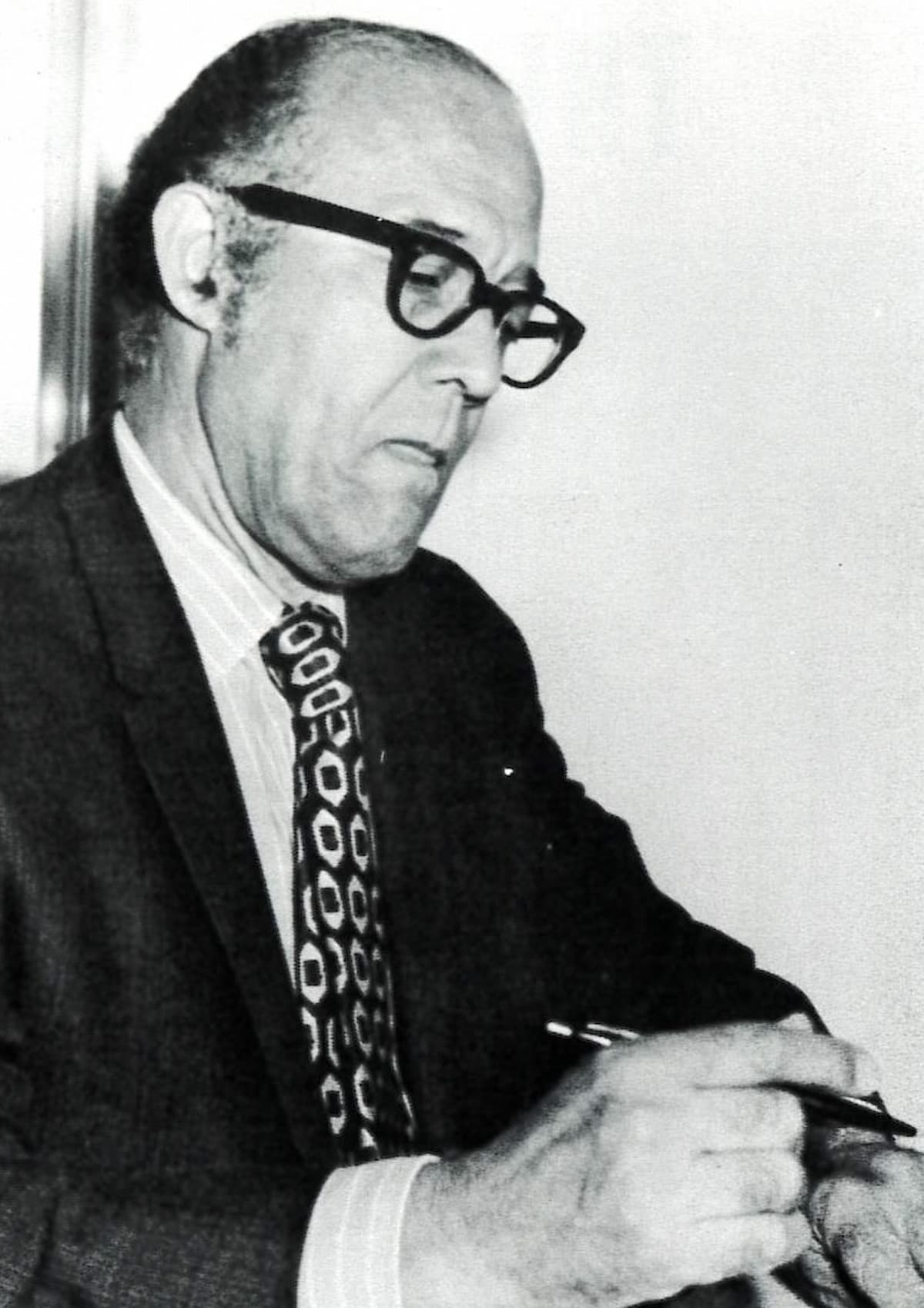Dennis Strobel '74 Establishes Cecil Blue Scholarship
Office of Communications and Marketing
Young Hall
820 Chestnut Street
Jefferson City, MO 65101
 LU alumnus Dennis Strobel has established the Cecil Blue Memorial Scholarship Fund to honor his mentor, the late Professor Cecil Blue.
LU alumnus Dennis Strobel has established the Cecil Blue Memorial Scholarship Fund to honor his mentor, the late Professor Cecil Blue.
The influence of a great professor lasts far beyond the classroom. For generations of Lincoln University students, faculty have not only shaped knowledge but also inspired lives, careers and legacies.
One such professor, the late Cecil Blue — an English scholar, Harlem Renaissance writer and beloved member of the LU faculty for nearly five decades — left a lasting impression on alumnus Dennis Strobel. Now, Strobel is ensuring that Blue’s legacy continues to inspire future Blue Tigers through the establishment of the Cecil Blue Memorial Scholarship Fund.
Strobel, who graduated from Lincoln in 1974, has named his alma mater as the beneficiary of an Individual Retirement Account currently worth about $180,000 in a testamentary gift to establish the Cecil Blue Memorial Scholarship Fund, honoring the legacy of Strobel’s one-time professor of English literature. The IRA will transfer to Lincoln upon Strobel’s passing. In addition, Strobel has pledged to jump-start the scholarships during his lifetime with yearly contributions of about $6,400 from his required minimum distribution of the same IRA to support an annual scholarship in Cecil Blue’s name.
 Cecil Blue - 1969
Cecil Blue - 1969
“We are grateful to Dennis Strobel for his generous gift in honor of Cecil Blue,” said Lincoln University President John Moseley in announcing the gift. “The yearly contributions to fund the annual scholarships, which begin in 2025, will have an immediate and lasting impact upon our Blue Tiger students.”
Cecil Blue taught at Lincoln from 1928 to 1975. Born in Georgetown, Guyana, in 1902, Blue emigrated to America and earned his bachelor’s and master’s degrees from Harvard University. He joined the Lincoln faculty in 1928, part of the second wave of East Coast-educated professors that LU President Nathan Young hired to bolster Lincoln’s accreditation efforts in the 1920s. After his retirement, Blue remained in Jefferson City until his death in 1983.
Strobel grew up in Lohman, Missouri, a small town near Jefferson City where his parents owned a general store. He graduated from Russellville High School and headed for college at nearby Lincoln University. Although his first love was history, he opted to earn his bachelor’s degree in mathematics from Lincoln with additional coursework in computer programming. He later added a master’s degree in technology management from Georgia Tech. He forged a successful 43-year career in information technology, beginning as a programmer for the Missouri Division of Employment Security before moving on to a programmer/analyst job at Westinghouse in Jefferson City. He spent 14 years at Mitsubishi as manager of its management information systems in the consumer electronics and wireless communications division. Strobel capped his career as director of information technology at BWAY Corp., retiring in 2017. He says he never forgot Blue, his English literature teacher, whose class he took in the summer of 1971.
“He was a very personable, intelligent gentleman,” Strobel recalls. “He could engage the entire class. He encouraged participation and got everyone involved. I took his class because it fulfilled a requirement, but I enjoyed the class a lot.”
Living in the Atlanta area for the past 24 years, Strobel kept Lincoln in his thoughts as he fed his history bug, often researching the university’s history. He discovered “The Soldiers’ Dream” books written in two parts by local historians and available on Blue Tiger Commons. The books sparked Strobel to dig further into Lincoln’s faculty experience, reading Missouri historian Gary Kramer’s books and watching interviews and lectures on C-SPAN’s Book TV.
 Cecil Blue- 1973
Cecil Blue- 1973
“Lincoln recruited all these Black professors educated at prestigious eastern schools to join the LU faculty,” Strobel says. “They kept coming — in the ’20s, ’30s and ’40s. But when they arrived in Jefferson City, many of them were not treated well. I want today’s students to know about their difficulties and the bravery it took for those faculty members to come here and teach.” Their impact on students, he adds, remains alive more than five decades later.
“Lincoln is special to me,” Strobel says. “My degree opened the way to good jobs over the years, a good career, and I wanted to give back.”
Strobel has donated to Lincoln in the past, but when he decided to establish a scholarship fund, he consulted Grant Winrow, LU’s vice president for university advancement. “Dr. Winrow suggested I could name the scholarship after any of my professors,” he says. “Cecil Blue was the first one I thought of. I want to get Professor Blue’s story told. He needs to be remembered.”
 Dennis Strobel ’74 makes a gift in honor of Cecil Blue.
Dennis Strobel ’74 makes a gift in honor of Cecil Blue.
Strobel says he hopes the Cecil Blue Scholarship will build on the impact of those pioneering professors who came to Lincoln to educate others.
Winrow expects Strobel’s gift to have a ripple effect. “We hope that Mr. Strobel’s compassionate gift for his beloved alma mater will inspire other alumni to consider giving back in similar ways,” Winrow says. “Each of us has a ‘Professor Blue story’ — a faculty member whose guidance shaped our path. Supporting Lincoln is one way to honor that legacy and ensure today’s students have the same life-changing opportunities.”
Strobel hopes his gift will also inspire new students, encouraging them to join LU and take advantage of the same type of support he once found here.
“I hope it can inspire students to come to Lincoln and professors to come to Lincoln,” Strobel says. “I want to continue their legacy.”
